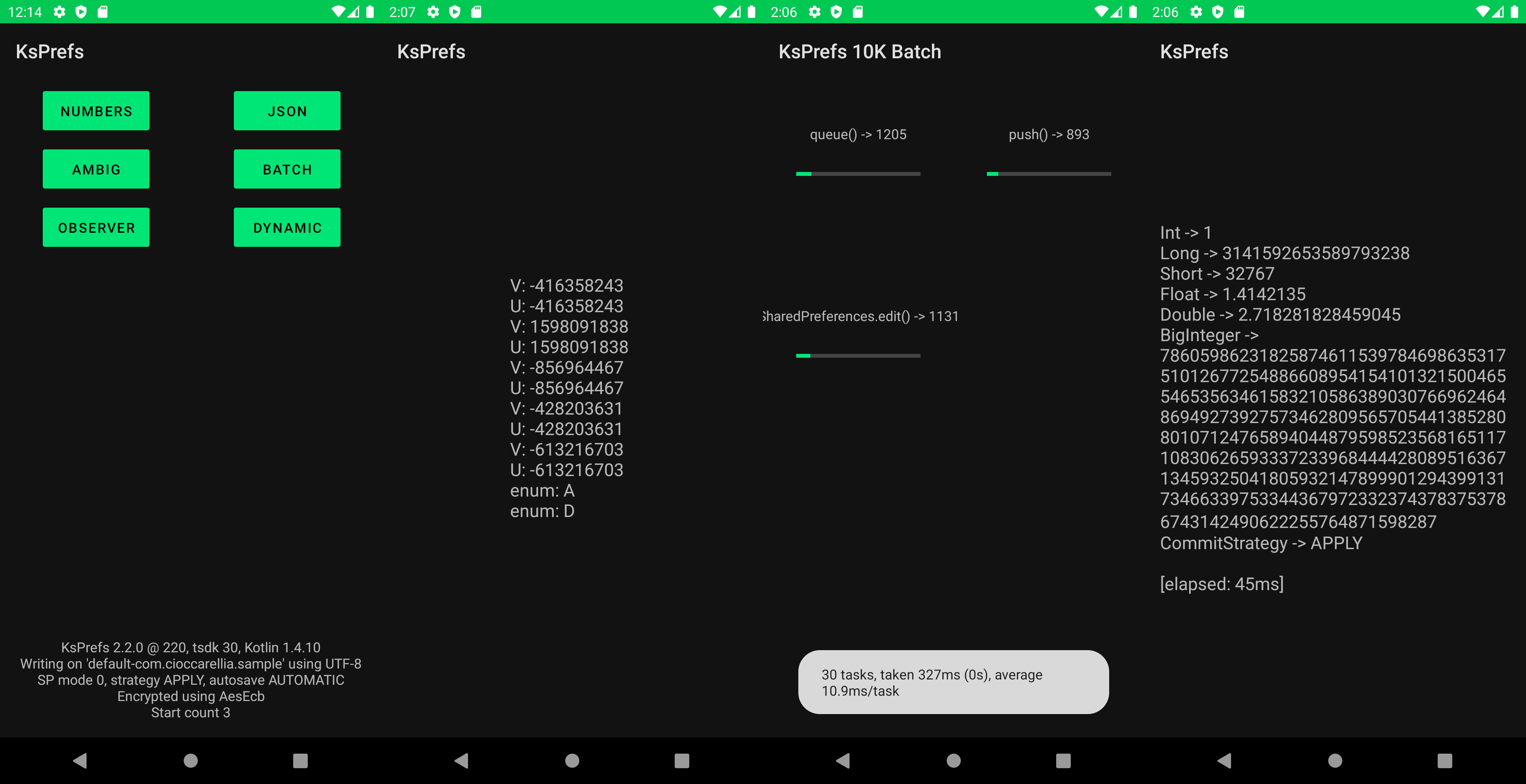Secure SharedPreferences
Gradle
dependencies {
implementation 'com.github.cioccarellia:ksprefs:2.4.1'
}Kotlin DSL
dependencies {
implementation("com.github.cioccarellia:ksprefs:2.4.1")
}Maven
<dependency>
<groupId>com.github.cioccarellia</groupId>
<artifactId>ksprefs</artifactId>
<version>2.4.1</version>
<type>pom</type>
</dependency>- Powerful SharedPreferences wrapper & API.
- Easy to pick up & use right away.
- Tested and production-ready.
- Fully customizable behaviour.
- Built-in cryptography & decoding engines (PlainText, Base64, AES-CBC, AES-ECB, Android KeyStore + AES-GCM / RSA KeyPair).
- Extensive type & enum support.
val prefs = KsPrefs(applicationContext)
val count = prefs.pull<Int>("app_start_key")To read from SharedPreferences, use pull(key, fallback).
To write to SharedPreferences, use push(key, value).

KsPrefs (Kotlin Shared Preferences) is a wrapper for the default Android SharedPreferences (SP for short) implementation.
Its purposes are to bring security to preference storage through cryptography, to implement an elegant and practical SP API, and to do so with as little overhead as possible.
Ksprefs can be used as a replacement of direct SP usage, which lacks both security and practicality, and which even Google is moving away from with Jetpack DataStore.
On top of the SP API, KsPrefs extends with numerous features and extra bits which come pre-packed with the library, and can be used to enhance the development experience and productivity.
You should create KsPrefs only once in your codebase.
val prefs = KsPrefs(applicationContext)It is recommended to keep it inside your Application class, so that it's reachable everywhere from your code.
class App : Application() {
companion object {
lateinit var appContext: Context
val prefs by lazy { KsPrefs(appContext) }
}
override fun onCreate() {
super.onCreate()
appContext = this
}
}| Term | Description |
|---|---|
| SP | Android Shared Preferences |
| Entry | Key-Value pair stored by SP. Thus the basic data entity which can be pushed and pulled |
| Persistent XML Storage | SP XML file containing actual entries. Stored in the application private storage |
To retrieve saved values from SP you use pull().
Key uniquely identifies a record, fallback is the default value if none is found in SP.
val uname = prefs.pull(key = "username", fallback = nobody)There are 4 different variants of pull.
pull<T>(key, fallback<T>): Scans the preferences with the given key. If a record is found, the value is read from the persistent XML storage, deserialized as the requested type and returned. If the key isn't contained inside the storage, the fallback value is returned.pull<T>(key): No fallback value is suppliedpull<T>(key, kclass<T>)pull<T>(key, jclass<T>)
A function is defined safe when you supply the fallback (Android SharedPreferences defines it default) value, so that, for any given key, you always have a concrete in-memory value to return.
A function is unsafe because there is no guarantee it will return a concrete value, as it only relies on the supplied key to pull the value from the persistent XML storage
Even though the standard SharedPreferences API always forces you to provide a default (KsPrefs defines it fallback) value, KsPrefs allows you to leave that out, because supplying an actual instance of an object, in some contexts is verbose and redundant if you are know that the key is present inside the persistent storage, or if for some clever intuition you know that the key holds a value at some specific time.
val username = prefs.pull("username")📌 #1: Using an unsafe version of pull() isn't dangerous, as long as you are sure the target key holds a value.
📌 #2: The 3 unsafe functions accept the type parameter as a kotlin class, as a java class or as a kotlin generic. For the latter, the bytecode of the function is inlined, in order for the generic type to be reified.
To save values to the preference storage you use push()
Push takes a key and a value, and stores them inside the preferences, according to the commitStrategy, autoSavePoliciy.
prefs.push("username", viewModel.username)KsPrefs is configurable at initialization time with specific parameters.
Each parameters has a default value which will be used unless you specify otherwise.
Each parameter changes the internal behaviour and the algorithms used, so it is vital to choose the appropriate settings.
val prefs = KsPrefs(applicationContext) {
// Configuration Parameters Lambda
encryptionType = PlainText()
autoSave = AutoSavePolicy.MANUAL
commitStrategy = CommitStrategy.COMMIT
}| Field | Type | Description | Default Value |
|---|---|---|---|
| encryptionType | EncryptionType | Encryption technique used to encrypt and decrypt data | PlainText() |
| commitStrategy | CommitStrategy | Strategy to use at the moment of writing preferences entries to the persistent XML storage | CommitStrategy.APPLY |
| autoSave | AutoSavePolicy | Whether after a push() operation changes are saved to the persistent XML storage; saving strategy depending on commitStrategy |
AutoSavePolicy.AUTOMATIC |
| mode | Int | SharedPreferences access mode | Context.MODE_PRIVATE |
| charset | Charset | Charset used for string-to-byte and byte-to-string conversions | Charsets.UTF_8 |
| keyRegex | Regex? | Regular Expression which, if non null, every key must match. | null |
A pending transaction is a change which is registered in-memory, but not yet on the XML preference file.
Android SharedPreferences works that way; indeed, you can stack up pending transactions, but at some point you have to actually save them.
If the app were to shut down unexpectedly, those changes would be lost.
To commit any pending transaction to the persistent XML storage, in ksprefs you use save().
This matches commit() and apply() SharedPreferences behaviour you may be accustomed to.
By default, autoSave is set to AutoSavePolicy.AUTOMATIC, and therefore changes are automatically synchronized with the underlying XML file, because after each push() call, a save() follows, in order to automatically commit and save the preference. Therefore, no pending transaction is kept.
However, if autoSave is turned off (using AutoSavePolicy.MANUAL), push() will save the change in-memory, but is not going to write it to the XML preferences file until save() is invoked. This way it's going to create a pending transaction which will be kept in-memory until a save() operation happens.
Here is a table representing when values are saved to the storage, depending on the policy in use.
AutoSavePolicy |
AUTO | MANUAL |
|---|---|---|
| push() | ✅ | ❌ |
| queue() | ❌ | ❌ |
| save() | ✅ | ✅ |
| SharedPreferences.Editor.commit() | ✅ | ✅ |
| SharedPreferences.Editor.apply() | ✅ | ✅ |
📌 AutoSavePolicy chooses when to write changes to the persistent XML storage and when to keep them in memory.
The best (and default) practise while dealing with SharedPreferences is to use APPLY. It is asynchronous and fast. COMMIT is also available, though it should not be used unless you have a valid reason to, given its synchronous and strict nature, as well as NONE, for no-op (Does not save anything, used internally for queue()).
save() and push() always refer to the commit strategy to decide how to save their updates to the persistent XML preference storage.
Here is a table representing various features of different commit strategies. Check out the official documentation here and see this post for more intel.
CommitStrategy |
APPLY | COMMIT | NONE |
|---|---|---|---|
| in-memory | ✅ | ✅ | ✅ |
| XML | ✅ | ✅ | ❌ |
| async | ✅ | ❌ | ➖ |
| atomic | ✅ | ✅ | ➖ |
| error report | ❌ | ✅ | ➖ |
📌 The CommitStrategy involves how to write changes to the persistent XML storage.
To enqueue values to be written into the preference storage you use queue(). It follows push()'s syntax.
While push, by default, pushes the update immediately on the XML persistent storage (By default, changeable with AutoSave), queue() saves the update in-memory without writing it out to the storage.
Not writing the changes to the file makes enqueuing a valid choice for both batch computing or resource-expensive and long-running operations.
queue()takes a key and a value, and saves the changes in-memory.queue()does not actually send updates to the storage. You can do so by callingsave()(Or by usingpush()subsequently).
This segment touches a broader concept, which is storing scope. There are two storing scopes for SharedPreferences:
- in-memory (key-value pairs are kept in memory). This is fast to read to/write from, but does not persist application restarts.
- XML (key-value pairs are kept on a file). Writing to a file is mildly expensive but it allows preferences to survive across application restarts.
Here is a table explaining how different methods inside KsPrefs touch and go through those storing scopes.
StoringScope |
in-memory | XML |
|---|---|---|
| push(k, v) | ✅ | ✅ (By default) |
| queue(k, v) | ✅ | ❌ |
| save() | ✅ | ✅ |
📌 The StoringScope determines at which level changes are propagated.
In the following snippet (Given that autoSavePolicy is set to AUTOMATIC), n in-memory and x XML write operations are performed. This, given f(n) and f(x) for how long those operations will take, takes n×f(n) + m×f(x). Given that, if using push(), m=n, then it resolves to n×(f(n) + f(x))
for ((index, pic) in picsArray.toList().withIndex()) {
// Long-running computation
prefs.push("pic-$index", pic.url)
}Even though this isn't a significant speedup for small data sizes, as n (and m) grow the computation takes longer; since enqueuing values sets m=1, thus, f(n) < f(x). The time/op chart follows a much more gentle curve: n×f(n) + f(x).
This improvements drastically optimizes performances for a large amount of operations.
for ((index, pic) in picsArray.toList().withIndex()) {
// Long-running computation
prefs.queue("pic-$index", pic.url)
}
// One save operation
prefs.save()Please note, that if you set autoSavePolicy to MANUAL, push() will only change the in-memory values, and you will need to save them manually anyways.
KsPrefs provides some customizable data structures, to abstract preference reads/writes to function calls.
A PrefsCenter is to be though as a task-specific abstractor. It is used to enclose and contain all the SP-specific operations, such as providing a key, doing some value specific post-read/pre-write operation, providing the fallback value or the explicit return type, handling logic / conditions and interacting with other app components.
object StartCounterPrefCenter : PrefsCenter(App.prefs) {
private const val counterKey = "start_counter"
fun increment() = prefs.push(counterKey, read() + 1)
fun read() = prefs.pull(counterKey, 0)
}It is really useful and fun to have dynamic properties whose value is a direct representation of what the underlying XML preferences file contains.
val accentColor by prefs.dynamic("accent_color", "#2106F3")When you set a value for this property, it is also updated on the XML preference file, as it is a dynamic reference to the preference.
KsPrefs provides with different levels of encryption. From no encryption at all (EncryptionType.PlainText and EncryptionType.Base64), to standard AES with key size among 128, 192 & 256-bit and ECB/CBC modes (base64-wrapped ciphertext), to Android's own keystore system (though the ksprefs implementation isn't nearly as fast as the AES-backed one).
It is recommended to store the AES key into a native library shipped with your application, which makes reverse engineering your code harder.







